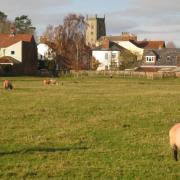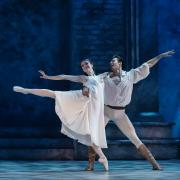The search is on for talented playwrights who will speak to a new generation. Robert Hastie chats to Tony Greenway.

An hour before I speak to Robert Hastie, the new(ish) artistic director of Sheffield Theatres, I manage to get hold of four tickets to the Harry Potter and the Cursed Child stage show in London. This is good news and bad news. On the upside, my children will be thrilled. On the downside, and aptly for Harry Potter, it means that £360 has been swiftly magicked away from my bank account. If our seats were in the stalls, this would be OK; but we’ll be about as far away from the stage as it’s possible to get: in the balcony, about halfway back. We’ll be so far up, we could have a game of Quidditch. Hastie sympathises. ‘Congratulations on getting the HP tickets, they’re like gold dust, he says. ‘But, ouch. That’s got to hurt. Going to the theatre can be an expensive business.’
And that is why he recently announced that Sheffield is dropping its lowest ticket prices, scrapping its booking fees, offering 10,000 £15 tickets across the new season and telling drama or performing arts students in Sheffield that they can come to the Crucible stage for free. ‘For me it’s about how do we open our doors as wide as possible,’ he says. ‘There are lots of reasons why people go, or don’t go, to the theatre and price is right up there among them.’
Hastie took up the artistic director role last July, which means he gets the job of overseeing three of Yorkshire’s most important stages: The Crucible, The Lyceum and The Studio. In November, he announced his first theatre season, which includes a mix of classic plays and new writing.
Shakespeare productions in Sheffield — notably Richard III with Kenneth Branagh, The Tempest with Derek Jacobi, Othello with Dominic West and Clarke Peters and Edward II with Joseph Fiennes — have been widely acclaimed in the past. Hastie is keen to keep this tradition going and, to kick off his directing career at The Crucible, has chosen a new production of Julius Caesar (May 17th – June 10th). The advertising blurb his team has written for the play chimes horribly with recent events: ‘When the majority chooses a dangerous leader, what should the honourable citizen do?’ it asks. Presumably Hastie’s Caesar won’t be orange and have a bad comb-over, but it’s still alarmingly prescient for 2017. ‘When we programmed it, we perhaps hoped that it wouldn’t be as relevant as it turned out to be,’ he agrees.

Then there’s Tribes in The Studio (June 29th–July 22nd), a regional premiere of a play by Nina Raine, directed by Kate Hewitt, winner of the first Royal Theatrical Support Trust Director Award; Hastie himself will direct the world première of Of Kith & Kin (September 14th–October 7th), written by former social worker Chris Thompson. Other productions include Desire Under the Elms (September 20th–October 14th) and Uncle Vanya (October 18th–November 4th) plus a Hastie-directed Christmas production of the Wizard of Oz (December 7th–January 13th, 2018).
Hastie was born and raised in Scarborough and, after working in London, says it’s good to be back in Yorkshire. ‘My grandfather was born near Sheffield, and my parents were at college here. So the city always meant something to me growing up. When we went to the theatre, one of the places we came to was The Crucible. So Yorkshire is home. More sentimentally for me, it’s where I started my stage career as an actor.’
Indeed, Hastie was an actor for nearly 10 years and his first job after leaving RADA was playing 12 different spear-carrying roles in Edward Bond’s Lear. ‘The main thing I had to do was guard Ian McDiamid and chase him around the stage,’ he remembers. ‘That was no mean feat. I don’t know if you’ve ever tried to chase Ian McDiarmid around a stage?’ Not recently. ‘Well, he’s got a pair of legs on him. But, also, being up close to one of our finest classical actors was a real learning experience. I got a great education here about the technique and skill it takes to play a big theatre like The Crucible. So I grew up in Sheffield in terms of being both a theatre-goer and an artist.’
His first theatre experience was, he thinks, probably pantomime. ‘I went to see The Krankies in Hull! But the first thing that really hit me was one of Alan Ayckbourn’s shows for children. The Stephen Joseph Theatre (in Scarborough) was a great theatre to be around. Theatre for me has never been just about London because I grew up in a town where the world’s most prolific playwright was on my doorstep. Of course, I didn’t know how lucky I was at that point.’

Much has been made in parts of the press about Hastie’s meteoric rise as a director. His first taste of professional directing came as an associate on Josie Rourke’s West End production of Much Ado About Nothing, starring Catherine Tate and David Tennant. He followed this with acclaimed productions of Events While Guarding the Bofors Gun, Splendour and My Night with Reg, which landed him an Evening Standard Theatre Award nomination. He also became associate director of the Donmar Warehouse in London. ‘I didn’t fall out of love with acting until I began directing,’ he says. ‘But as soon as I started I thought this was what I was meant to do.’
Still, he’s never felt like an overnight success. ‘When the Evening Standard came calling, it was to tell me that I’d been nominated for Best Newcomer — at the age of 37!’ he says. ‘Anyway, right now, on the edge of 40, there’s nothing to keep you young like the challenge of running three buildings.’ Or to prematurely age you because, on the glass is half empty side, being in charge of not one but three theatres in these financially precarious times must feel like quite a responsibility. ‘All the reason to make it a more irresistible prospect,’ says Hastie cheerfully. ‘Daniel Evans was a wonderful artistic director and did fantastic work, so I feel hugely indebted to him. But I relish the challenge.’
And anyway, turning down the job just wasn’t an option. ‘I was very happy at the Donmar, and I had some great experiences there,’ he says. ‘But there’s no way I could have refused the possibility of getting to work at the Sheffield Crucible which is, for my money, the most beautiful and welcoming theatre space in the country.’ Its reputation helps, he insists, because it attracts ‘the wealth of British talent’.
Hastie thinks that theatre in Yorkshire is currently in good shape. ‘Speaking from Sheffield’s perspective, our audience numbers are healthy and getting healthier. That’s got to be the chief measure. Are people coming to the theatre? Yes, they are. Playwrights like John Godber and Alan Ayckbourn are titanic talents that loom large on any theatrical landscape but the only way forward is to hunt for new voices, ones that speak to the next generation. That’s something that’s very important to me and will form a big part of (what we do at) Sheffield.’
That’s good. But how will he measure his own success? ‘Any artistic director would like to see their theatres full,’ he says. ‘There are people out on the street today who don’t think the theatre is for them. But if, in three years’ time they and their mates and families are walking through our doors, that’s what success will look like to me.’



























